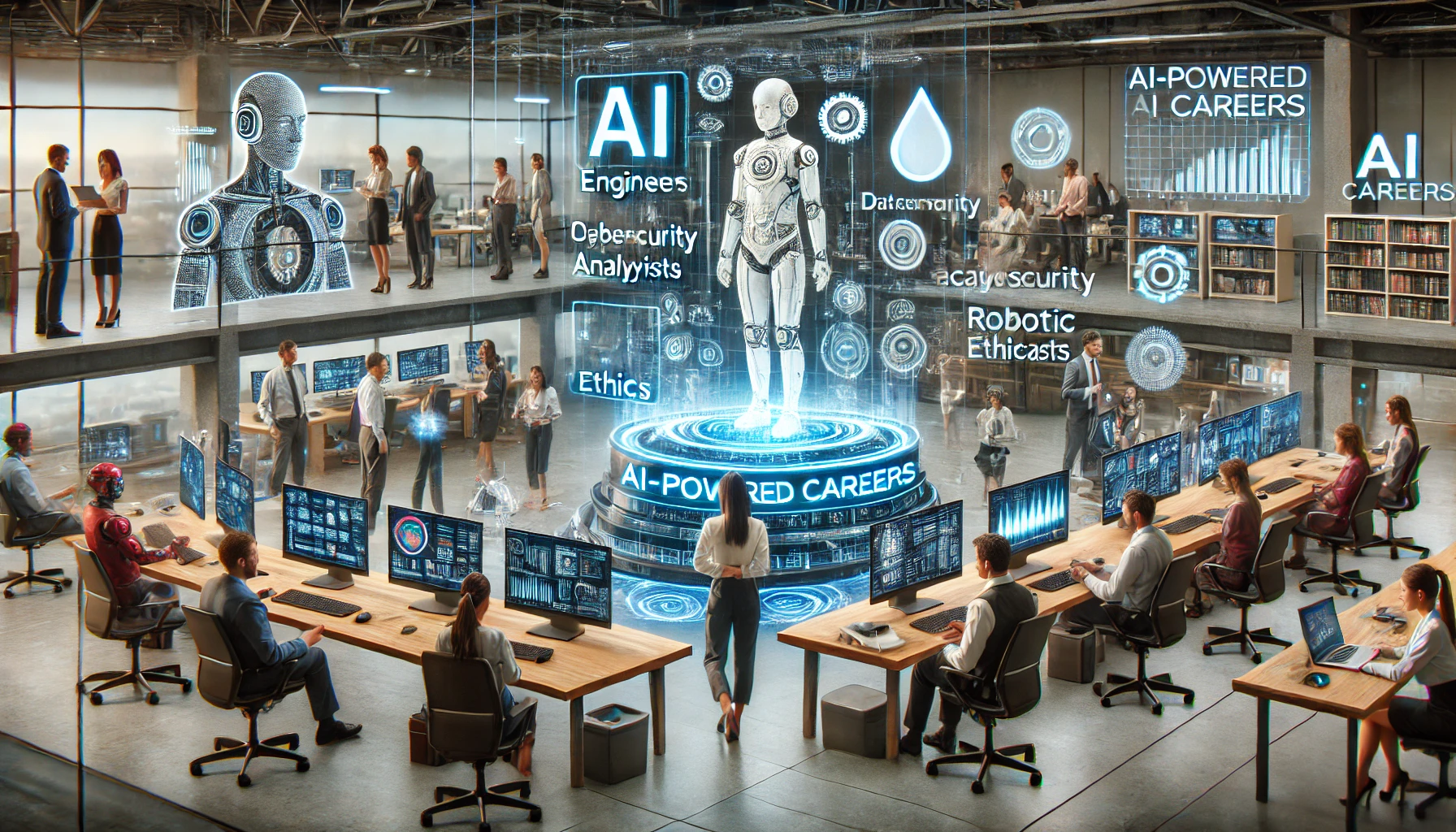Artificial Intelligence (AI) is transforming industries worldwide, creating new job opportunities while reshaping existing roles. As businesses increasingly adopt AI-driven solutions, the demand for skilled professionals in AI-related fields is growing rapidly.
Whether you’re a student, a professional looking to switch careers, or an entrepreneur exploring AI opportunities, understanding the most in-demand AI jobs can help you prepare for the future. In this article, we’ll explore the top careers in the AI-powered job market, what they entail, and how to get started in each field.
AI & Machine Learning Engineer
AI and Machine Learning Engineers design, develop, and optimize AI models and algorithms. Their work includes training AI systems to recognize patterns, make predictions, and automate tasks.
Key Responsibilities
- Developing AI models and machine learning algorithms
- Training AI systems using large datasets
- Optimizing models for accuracy and efficiency
- Working with deep learning frameworks like TensorFlow and PyTorch
Required Skills
- Proficiency in Python, R, or Java
- Knowledge of machine learning algorithms
- Experience with deep learning frameworks
- Strong mathematics and statistics background
How to Get Started
Learn Python and machine learning concepts through online courses. Work on AI projects using datasets from Kaggle or Google Colab. Earn certifications like Google’s TensorFlow Developer Certificate or Coursera’s Machine Learning by Andrew Ng.
Data Scientist
Data Scientists analyze vast amounts of data to generate insights, build predictive models, and drive AI innovations. They play a key role in training AI systems to make data-driven decisions.
Key Responsibilities
- Collecting, cleaning, and analyzing large datasets
- Creating predictive models and AI-driven solutions
- Visualizing data trends to help businesses make informed decisions
- Collaborating with AI engineers to enhance machine learning models
Required Skills
- Expertise in Python, SQL, and R
- Knowledge of statistical analysis
- Experience with AI and data visualization tools (Tableau, Power BI)
- Ability to interpret complex data insights
How to Get Started
Learn Python for Data Science and SQL. Work with real-world datasets on Kaggle. Take an online Data Science Bootcamp from Udacity, DataCamp, or Coursera.
AI Ethics Specialist
AI Ethics Specialists ensure AI systems are designed fairly, without bias, and align with ethical and legal standards. They work to prevent AI from reinforcing discrimination, misinformation, or unethical decision-making.
Key Responsibilities
- Evaluating AI models for ethical risks and biases
- Creating guidelines for responsible AI use
- Working with developers and policymakers to ensure compliance
- Educating organizations on AI transparency and fairness
Required Skills
- Strong understanding of AI ethics and regulations
- Critical thinking and problem-solving
- Knowledge of AI fairness frameworks (Fairness Indicators, AIF360)
- Strong communication skills for policy development
How to Get Started
Study AI ethics courses from MIT or Harvard online. Follow AI ethics guidelines from Google, OpenAI, and IBM. Join organizations like The AI Ethics Lab.
Cybersecurity Analyst (AI-Powered Security)
With AI being used to enhance security, Cybersecurity Analysts protect AI-powered systems from cyber threats, data breaches, and hacking attempts.
Key Responsibilities
- Monitoring AI systems for vulnerabilities
- Using AI to detect and prevent cyber threats
- Developing security protocols for AI-driven platforms
- Investigating cyber attacks and implementing solutions
Required Skills
- Knowledge of cybersecurity frameworks (NIST, ISO 27001)
- Experience with AI-driven security tools
- Ethical hacking and penetration testing skills
- Python and network security expertise
How to Get Started
Take cybersecurity courses on CompTIA Security+ or CEH (Certified Ethical Hacker). Get hands-on experience with AI-based security tools. Work on ethical hacking projects in a virtual lab.
AI Trainer & Prompt Engineer
AI Trainers help improve AI performance by refining training data, testing AI responses, and ensuring AI models behave as expected.
Key Responsibilities
- Designing datasets to train AI systems
- Testing AI responses and correcting inaccuracies
- Fine-tuning AI-generated content and chatbots
- Ensuring AI aligns with business goals
Required Skills
- Strong analytical and problem-solving skills
- Understanding of Natural Language Processing (NLP)
- Ability to train and test AI models
- Writing and communication skills for AI chatbots
How to Get Started
Experiment with AI models like ChatGPT, Claude, and Google Bard. Learn NLP techniques through courses on Udacity or DeepLearning.AI. Explore AI training datasets on Hugging Face.
AI Product Manager
AI Product Managers oversee the development and implementation of AI-driven products, ensuring they meet market demands and business objectives.
Key Responsibilities
- Managing AI projects from development to deployment
- Communicating with engineers, data scientists, and business leaders
- Understanding AI capabilities and limitations for product innovation
- Ensuring AI products align with company strategies
Required Skills
- Product management and business strategy
- Knowledge of AI fundamentals and applications
- Strong leadership and problem-solving skills
- Experience with project management tools
How to Get Started
Learn AI for Business from Google AI or Stanford AI Lab. Gain experience managing AI-related projects. Get a Product Management Certification from PMI or Pragmatic Institute.
Final Thoughts: The Future of AI Careers
AI is not just changing jobs—it is creating new career paths and opportunities. As AI adoption grows, professionals who develop AI expertise will be in high demand.
If you’re looking to future-proof your career, consider gaining skills in AI development, data science, cybersecurity, or AI ethics. Whether you’re a technical expert or a business professional, there’s a place for you in the AI-powered job market.
Key Takeaways
- AI careers are booming across industries
- Demand for AI engineers, data scientists, and cybersecurity experts is rising
- Ethical AI and AI product management are growing fields
- Learning AI-related skills can give you a competitive edge
The future of work is AI-driven—are you ready to be part of it? 🚀
